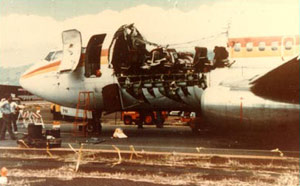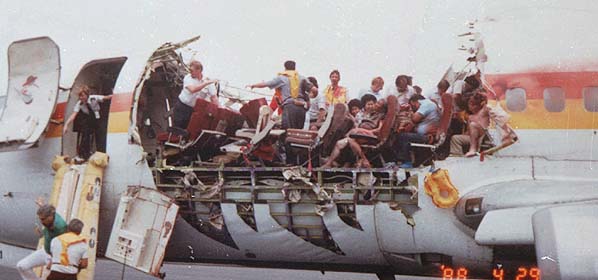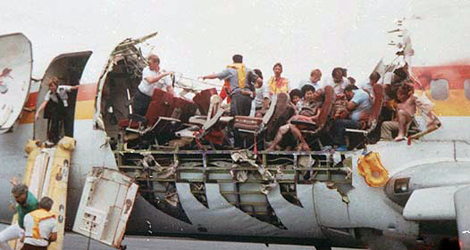Welcome to DU!
The truly grassroots left-of-center political community where regular people, not algorithms, drive the discussions and set the standards.
Join the community:
Create a free account
Support DU (and get rid of ads!):
Become a Star Member
Latest Breaking News
Editorials & Other Articles
General Discussion
The DU Lounge
All Forums
Issue Forums
Culture Forums
Alliance Forums
Region Forums
Support Forums
Help & Search
American History
Related: About this forumOn this day, April 28, 1988, Aloha Airlines Flight 243 was on its way from Hilo to Honolulu.
Last edited Fri Oct 20, 2023, 01:05 PM - Edit history (4)
Aloha Airlines Flight 243
Coordinates: 20°53.919′N 156°25.827′W

Fuselage remains after the emergency landing
Incident
Date: April 28, 1988
Summary: Explosive decompression caused by metal fatigue and maintenance error
Site: Kahului, Hawaii

Route of Aloha Airlines Flight 243. In blue, the original route, and in red, the detour after the incident.
Aloha Airlines Flight 243 (IATA: AQ243, ICAO: AAH243) was a scheduled Aloha Airlines flight between Hilo and Honolulu in Hawaii. On April 28, 1988, a Boeing 737-297 serving the flight suffered extensive damage after an explosive decompression in flight, but was able to land safely at Kahului Airport on Maui. There was one fatality, flight attendant Clarabelle Lansing, who was ejected from the airplane. Another 65 passengers and crew were injured. Despite the substantial damage inflicted by the decompression, and the loss of one cabin crew member, the safe landing of the aircraft established the incident as a significant event in the history of aviation, with far-reaching effects on aviation safety policies and procedures.
{snip}
Coordinates: 20°53.919′N 156°25.827′W

Fuselage remains after the emergency landing
Incident
Date: April 28, 1988
Summary: Explosive decompression caused by metal fatigue and maintenance error
Site: Kahului, Hawaii

Route of Aloha Airlines Flight 243. In blue, the original route, and in red, the detour after the incident.
Aloha Airlines Flight 243 (IATA: AQ243, ICAO: AAH243) was a scheduled Aloha Airlines flight between Hilo and Honolulu in Hawaii. On April 28, 1988, a Boeing 737-297 serving the flight suffered extensive damage after an explosive decompression in flight, but was able to land safely at Kahului Airport on Maui. There was one fatality, flight attendant Clarabelle Lansing, who was ejected from the airplane. Another 65 passengers and crew were injured. Despite the substantial damage inflicted by the decompression, and the loss of one cabin crew member, the safe landing of the aircraft established the incident as a significant event in the history of aviation, with far-reaching effects on aviation safety policies and procedures.
{snip}
FAA Lessons Learned From Civil Aviation Accidents

Photo of the fuselage damage on Aloha Airlines flight 243

Photo of the fuselage damage on Aloha Airlines flight 243
Posted on: Thursday, January 18, 2001
Engineer fears repeat of 1988 Aloha jet accident

On April 28, 1988, an Aloha Airlines 737's fuselage blew open at 24,000 feet, killing a flight attendant and injuring eight people.
Associated Press library photo • April 28, 1988

Graphic: A different theory of Aloha Flight 243
Studying what goes wrong is Austin's passion
Austin's Web site: www.disastercity.com
By Gary Stoller
USA Today
As an Aloha Airlines jet began landing on Maui, passenger Matt Austin noticed the luggage racks rattling and swaying when the thrust reversers came on. ... It didn’t startle him. He had seen that happen before on other older Aloha jets. But Austin remembered the name painted across the plane’s exterior: Queen Lili‘uokalani. It was a 19-year-old Boeing 737. ... A week later — on April 28, 1988 — the same jet’s roof ripped open 24,000 feet over the Pacific Ocean, killing one flight attendant and seriously injuring seven passengers and a crew member. Austin counted himself lucky. Aloha Flight 243’s last flight didn’t really begin to grip him until the next year, when the National Transportation Safety Board issued its accident report.
This is a detective story. It’s about a mystery that aviation professionals say was solved 12 years ago and the persistence of Austin, a former Hawai‘i boiler inspector, who has spent all those years and $45,000 of his money trying to prove that the experts got it wrong. ... It’s also about an accident that forever changed maintenance practices for old planes and about an alternative theory that could have far-reaching consequences. Finally, it’s about the intriguing possible parallels between boiler safety and airplane safety.
Austin, a mechanical engineer, has no professional expertise in airplane accidents. He is an expert on boilers; the NTSB once consulted him about a train boiler explosion in Gettysburg, Pa. Austin, 43, runs a consulting business, Hawaiian Steam Engineering, which designs, inspects and restores boilers and locomotives. He also consults for the Navy on servicing nuclear submarine power plant components.
Since 1989, Austin has researched the Aloha accident independently, always maintaining that his only motivation is "engineering truth" and a conviction that sharing his insights can prevent similar accidents. He has a Web site, www.disastercity.com, where he details his theories on the Aloha accident and other disasters.
{snip}
Engineer fears repeat of 1988 Aloha jet accident

On April 28, 1988, an Aloha Airlines 737's fuselage blew open at 24,000 feet, killing a flight attendant and injuring eight people.
Associated Press library photo • April 28, 1988

Graphic: A different theory of Aloha Flight 243
Studying what goes wrong is Austin's passion
Austin's Web site: www.disastercity.com
By Gary Stoller
USA Today
As an Aloha Airlines jet began landing on Maui, passenger Matt Austin noticed the luggage racks rattling and swaying when the thrust reversers came on. ... It didn’t startle him. He had seen that happen before on other older Aloha jets. But Austin remembered the name painted across the plane’s exterior: Queen Lili‘uokalani. It was a 19-year-old Boeing 737. ... A week later — on April 28, 1988 — the same jet’s roof ripped open 24,000 feet over the Pacific Ocean, killing one flight attendant and seriously injuring seven passengers and a crew member. Austin counted himself lucky. Aloha Flight 243’s last flight didn’t really begin to grip him until the next year, when the National Transportation Safety Board issued its accident report.
This is a detective story. It’s about a mystery that aviation professionals say was solved 12 years ago and the persistence of Austin, a former Hawai‘i boiler inspector, who has spent all those years and $45,000 of his money trying to prove that the experts got it wrong. ... It’s also about an accident that forever changed maintenance practices for old planes and about an alternative theory that could have far-reaching consequences. Finally, it’s about the intriguing possible parallels between boiler safety and airplane safety.
Austin, a mechanical engineer, has no professional expertise in airplane accidents. He is an expert on boilers; the NTSB once consulted him about a train boiler explosion in Gettysburg, Pa. Austin, 43, runs a consulting business, Hawaiian Steam Engineering, which designs, inspects and restores boilers and locomotives. He also consults for the Navy on servicing nuclear submarine power plant components.
Since 1989, Austin has researched the Aloha accident independently, always maintaining that his only motivation is "engineering truth" and a conviction that sharing his insights can prevent similar accidents. He has a Web site, www.disastercity.com, where he details his theories on the Aloha accident and other disasters.
{snip}
Thu Apr 28, 2022: On this day, April 28, 1988, Aloha Airlines Flight 243 was on its way from Hilo to Honolulu.
Wed Apr 28, 2021: On this day, April 28, 1988, Aloha Airlines Flight 243 was on its way from Hilo to Honolulu.
Tue Apr 28, 2020: On this day, April 28, 1988, Aloha Airlines Flight 243 was on its way from Hilo to Honolulu.
